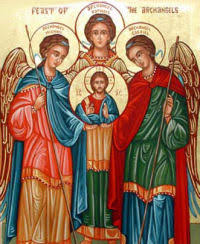HOMILY WEEK 26 02 – Year II
Known and Loved – Like Nathanael:
Feast of Saints Michael, Gabriel and Raphael
(Rev 12:7-12; Ps 138; Jn 1:47-51)
*******************************************************
Have you ever wondered what it must have been like to be one of the apostles and meet Jesus in person?
 Today’s feast of the Archangels and the gospel encounter of Nathaniel with Jesus invite us to be like him – known and loved by God, and transformed into a faithful disciple ready for any spiritual struggle.
Today’s feast of the Archangels and the gospel encounter of Nathaniel with Jesus invite us to be like him – known and loved by God, and transformed into a faithful disciple ready for any spiritual struggle.
Nathaniel reacts with doubt at first, but unlike official Israel, is open and willing to check Jesus out. As such, he represents the new Israel, constituted by those who come to Jesus, and quickly proclaims Jesus was “Son of God” and “King of Israel.” Something happened to Nathanael that day. Amazed that Jesus saw into his heart, even though they had just met, in that moment, Nathanael knew he was known and loved by God. When we arrive at that place where, in our deepest selves, we can accept being known and loved by God, just as we are, something happens to us also.
In the passage about Nathaniel, the church recognizes that Jesus fulfils all the eschatological expectations and hope of Israel. The term Israelite is used only here in John and conveys Nathanael’s faithfulness, like Ps 32:2 and its description of the righteous believer. Nathaniel correctly perceives Jesus’ superhuman knowledge as an act of self-revelation and so comes to faith. His response is more confession than witness. Son of God is the central expression of Jesus’ identity in the Fourth Gospel, because it recognizes Jesus’ true origins.
The response of Nathaniel is the witness of the entire gospel. Jesus here is Son of God and King of Israel, opening up to Thomas’ My Lord and God at the end. Israel means one who will see God so the description of Jesus as Son of God and King of Israel by Nathaniel is fitting.
Multiple layers of meaning follow: Salvation, Power and Kingdom of God put together, Authority of the Messiah, Blood of a Lamb, a hint of martyrdom, Son of Man, presence of God in glory, fulfilment of the old covenant in the new, joining of heaven and earth – what is clear is the glory of God has achieved its perfection as something revealing itself to humanity in the person of Jesus of Nazareth, the Lamb of God, Son of God, Son of Man, who would become Kyrios, the Risen Lord.
The angels “ascending and descending” upon the “Son of Man” (note this subtle distinction by Jesus from the “Son of God” of Nathanael) signifies that the experience of being completely known by God as we are, yet totally accepted and loved in Jesus, transfers us into and makes present the kingdom of God here on earth, in which we are to “live and move and have our being.” Two sayings come to mind here – Catherine of Sienna’s “It is heaven all the way to heaven” and Sr. Teresita Kambeitz’s “God accepts us as we are but believes in whom we can become.”
John’s vision of the heavenly war and the defeat of the great dragon is very interesting and significant in one detail – the ancient serpent is called “the Devil and Satan.” Why these two names? I believe they contain within them the nature of the believer’s continual struggle with the dark forces of division and mindlessness here on earth, even within the kingdom of God.
Ron Rolheiser’s insights are helpful here: The word devil comes from the Greek diablos meaning to divide. On the one hand, the evil one is always trying to cause division wherever unity is prized. So, any force in and out of the church that is trying to divide a family community or group into opposing factions, rife with strife, is in a sense diabolical. The evil one is present and hard at work as the devil.
On the other hand, the evil one as Satan is always trying to gather people together, but for the wrong reason – to kill, murder and destroy. Think gangs, ISIS, Boko Haram – always recruiting and gathering new members but for the sole purpose of achieving selfish ends of money, fame and power at any cost. Often this manifests itself in a mob mentality where reason is thrown out the window and violent energy released that in the end brings only misery and no good. Fads and social media movements that are not healthy or even amoral can easily tap into this kind of dark energy.
This feast of the Archangels features a war that took place in the heavens. It should alert us to the spiritual warfare that will naturally take place on earth as the dark forces of evil try to stamp out the growing shoots of the newly inaugurated kingdom of God among us.
May the faith of Nathanael, and the power of the Eucharist we celebrate daily or weekly sustain us in the reality that we are known and loved by God. And in the assurance that, in the words of Julien of Norwich, “all shall be well and all shall be well, and in the end, all manner of thing shall be well.”



